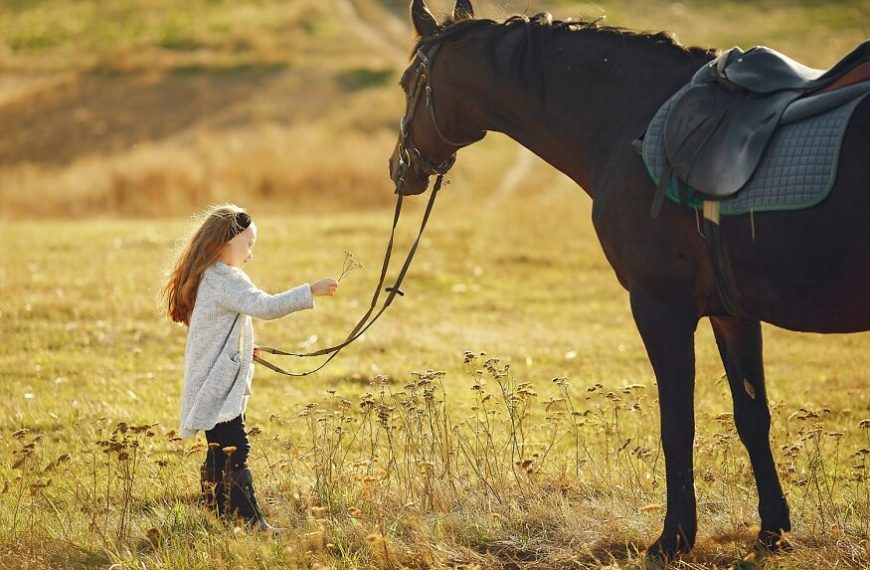Welcome to the majestic world of horses! These noble creatures have captured the hearts of people for centuries with their grace, power, and intelligence. This blog is a treasure trove of horse facts for kids, packed with fascinating horse information that will gallop through the history of horses and into the intricacies of their behaviour. So saddle up, young readers, as we take a journey through the equine world!
Understanding the Equine Family – Horse Facts for Kids
Did you know that the scientific name for the horse family is Equidae? Horses belong to a group called “equines,” which also includes zebras and donkeys. Each horse has its own unique “fingerprint”—no two horses have the same pattern of whorls (hair swirls)!
- The Various Horse Breeds
- The Grand History of Horses
- The Initial Behaviour of Horses
There are over 350 breeds of horses, each with distinctive characteristics, colours, and sizes. The Shetland pony, known for its small stature, is perfect for young riders, while the Arabian horse is admired for its stamina and speed. The majestic Clydesdale, with its towering height and feathered hooves, is another breed that showcases the diversity of these beautiful animals.
The history of horses is as fascinating as it is ancient, stretching back to an era over 50 million years ago. These early ancestors of today’s horses, known as Eohippus, were small, forest-dwelling creatures about the size of a fox. Through a process called evolution, these tiny creatures gradually transformed into the large, majestic animals we know today. By around 4000 BC, humans began to domesticate horses, and this partnership revolutionised many aspects of human life. Horses became instrumental in changing the dynamics of warfare; their speed and strength turned them into vital assets during battles. In agriculture, they pulled ploughs and transported produce, profoundly affecting farming efficiency. As transportation, they connected civilizations, facilitating trade and cultural exchange, and in sports, they brought about thrilling races and competitive equestrian events. The history of horses is a mirror reflecting our own, revealing the innumerable ways these noble beasts have helped shape human civilization.
What was the behaviour of the horse initially? Wild horses lived in herds and were prey animals, which means they were often hunted by predators. This heritage is why horses are alert and quick to flee; it’s their instinct to survive. Over time, domestication has made them more friendly and companionable, but that instinctive behaviour is still a part of them.
The Horses’ Contribution to Human History
Horses have been more than just companions; they have been integral to human development. They’ve carried knights into battle, helped farmers plough fields, and provided a means of swift transportation before the invention of cars. In many cultures, including in India, horses have a place of honour in history and mythology.
- Behaviour and Characteristics of Horses
- Caring for Horses
Horses communicate through body language. They use their ears, eyes, and nostrils to express their mood. They’re also social animals who form bonds with other horses and even humans. A happy horse will have a relaxed posture and soft eyes, while an anxious one might have wide eyes and flared nostrils.
Caring for horses is both a responsibility and a joy. A healthy diet for a horse includes quality hay or grass, grains, and access to fresh water. They also require regular grooming, which not only keeps their coat shiny but also strengthens the bond between the horse and its caretaker. Exercise is paramount; it keeps their muscles strong and their mind engaged. Horses thrive on routine and require a clean and safe environment, with ample space to trot and gallop. Their living quarters should provide protection from harsh weather and be regularly maintained to prevent disease. Proper veterinary care is also essential, including vaccinations, dental check-ups, and hoof care. Understanding and meeting these needs are critical for any horse owner and contribute significantly to the well-being and happiness of these graceful animals.
Fun Activities Involving Horses
Horse riding is not just a thrilling activity but also an educational experience. Beyond riding, children can engage in grooming sessions, learning to care for the horse’s coat, mane, and hooves, which teaches them about the importance of hygiene and care. In India, equestrian sports are gaining popularity, and opportunities for horseback archery, polo, and show jumping are on the rise. These sports help children develop not just balance and coordination but also confidence and decision-making skills. Moreover, therapeutic riding programs have shown remarkable benefits in improving the emotional and physical health of participants. By engaging with horses, children learn empathy, patience, and the value of non-verbal communication, skills that are invaluable in every walk of life.
The Symbolism of Horses in Indian Culture
In India, horses hold a place of reverence and symbolism in various cultural and religious contexts. The horse is often associated with the sun and speed in Hindu mythology. It is also symbolic of power and nobility, as seen in the story of the magnificent winged horse, Uchchaihshravas, which emerged from the ocean during the churning of the Milky Ocean. The traditional Indian wedding procession, or “baraat,” often features the groom riding a beautifully adorned horse. Festivals like Ashwa Poojan, which means ‘worship of the horse,’ are a testament to the enduring legacy and respect for horses in Indian culture.
At EuroKids, we believe in nurturing the curiosity and growth of every child. Just as horses require care and understanding, we provide a nurturing environment for your child’s education and development. Our curriculum is designed to encourage learning through exploration and fun – much like the journey through the world of horses we’ve embarked on today.
Horses are more than just animals; they represent strength, companionship, and history. Children can develop a greater appreciation for these magnificent animals by studying about horse breeds, their history, and their behaviour. We hope this blog has ignited a passion for horses in the hearts of our young readers.
Remember, like the versatile and adaptive horses, children too have immense potential when provided with the right environment to learn and grow. EuroKids is committed to being the nurturing ground for the young minds of India, helping them to gallop towards a bright and successful future.
For those eager to learn more about horses or seeking a supportive educational environment for your children, consider EuroKids, where learning gallops along with fun and care. Join the EuroKids family and let your child’s educational journey be as exciting as a horseback ride through history!
You May Also Like These, Interesting facts about rockets
















